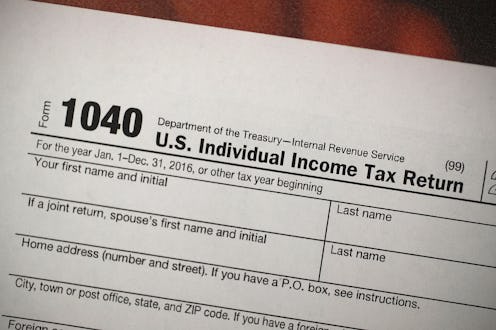News
How To Get Your Tax Refunds On Time No Matter What Happens With The Shutdown

The government shutdown, now approaching its sixth week, is hindering the work of the Internal Revenue Service and threatening to stall the tax return process. Many people rely on IRS refunds to pay their bills. Whether you're one of them, or just eager to receive the money you're owed, you may be wondering how to avoid the government shutdown delaying your tax refunds.
On Friday, The Washington Post reported that 14,000 IRS workers missed work this week. The Trump administration had previously called in 36,000 furloughed employees on Jan. 15 to prepare for the tax season. Most IRS workers aren't getting paid while the government is closed.
As with many consequences of the shutdown, absences at the IRS are likely hitting the most vulnerable the hardest: Tax refunds provide the largest single cash disbursement many low-income Americans get all year, per The New York Times. A new Salary Finance survey found that 42.9 percent of Americans need to use their refund to pay day-to-day bills this year. Plus there's the fact that, according to the Post, some of the highest number of absences are among the IRS workers whose job it is to explain the refund process to taxpayers (not everyone can afford expert advice; people are less likely to use a preparer if they're low-income).
There's some disagreement on whether or not the absences will actually stop refunds from being issued on time. The agency itself has assured the public that it will be able to process refunds on schedule during the shutdown, and a senior administration official told Bustle on Jan. 7 that the IRS "can in fact process tax refunds during a [funding] lapse." Still, many analysts have expressed skepticism that the agency will actually be able to pull that off, and IRS union leaders have said that they do expect delays, per The Washington Post.
Then again, the government could reopen before the most significant problems arise for the IRS. If President Donald Trump agrees to a temporary continuing resolution, as The New York Times reported he might on Friday, there may be no delays. The IRS is supposed to begin processing returns on Monday.
But even if the government does reopen, there's still a chance that the lawmakers could fail to come to a long-term agreement before the continuing resolution ends. That would cause yet another shutdown. Just in case, there are steps you can take to help prevent your refund from being delayed. Most tax returns are processed automatically, and those ones shouldn't experience delays, USA Today reports. But returns are only automatic if you file online, so be sure to go electronic this year instead of filling out a paper return. You can use the IRS' free online system, another online tax filing software, or a preparer who will file electronically for you.
The second most important thing you should do is to ensure that your return doesn't have any errors this year. According to USA Today, returns with mistakes could be held up within the automated system and require an actual IRS agent to review them. If there's no IRS agent on duty, that could take a while.
"If there are no glitches on a return that requires no intervention, then those returns will go through fine and those refunds will be issued in the normal time frame," Kathy Pickering of The Tax Institute at H&R Block told USA Today. "Where people are going to have issues is if they need to interact with the IRS or something on a return needs further review." Use the agency's checklist to make sure that you've included every necessary item with your return.
The Salary Finance survey found that two-thirds of Americans are worried right now about whether they're going to get their tax refunds on time. We'll know soon enough: Money.com reports that IRS usually processes electronic returns within three weeks, which means that the first refunds should begin to go out in late February. If that doesn't happen, it could mean that the shutdown is causing delays.